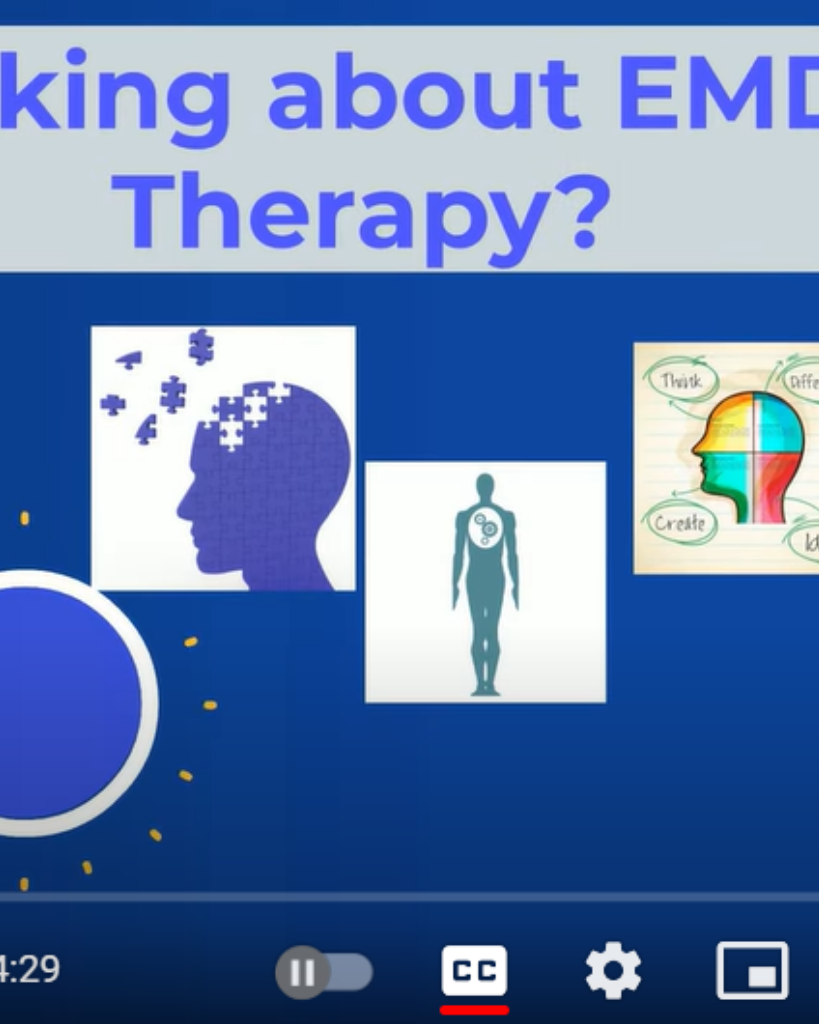What does EMDR therapy look like? This short video for clients explains the 8 Phases of EMDR Therapy and what they might experience in EMDR therapy sessions.
EMDR therapists are encouraged to share this video with clients seeking information about trauma-informed psychotherapy.
Video Transcript
0:00:04
EMDR
- Extensively researched and evidence-based
- Effective psychotherapy
- Helps people recover form trauma and other distressing life experiences (without talking at length)
- Eight Phases (over the course of a number of sessions
*should always be administered by a professional who is fully trained in EMDR therapy
0:00:30
Phase 1 History Taking & Treatment Planning
0:00:37
1. History Taking & Treatment Planning Phase
- The therapist develops a treatment plan according to your needs and situation.
- Your therapist will help you identify important aspects of your life story.
- You will discover the connection between your current problems and your past.
- You will identify your strengths & resources.
- Your personal and cultural context are important.
0:01:02
Phase 2: Preparation
0:01:07
2. Preparation Phase
Your therapist will explain EMDR, clarify expectations & test out eye movements (tapping or tones) and:
- Build a working relationship with you.
- Address your concerns.
- Help you develop tools to continue with the next phases of EMDR.
- Address your readiness for the next phases.
0:01:30
Phase 3: Assessment
0:01:34
3. Assessment Phase
Your therapist and you agree to work on a memory of a disturbing event and briefly talk about it.
Your therapist asks questions about the event including:
- Images
- Thoughts
- Feelings
- Body sensations
0:01:50
Phase 4: Desensitization
0:01:54
4. Desensitization Phase
- You think about the event AND follow movements with your eyes (or use tapping or tones).
- Reprocessing begins (working on disturbing memory).
- You notice what happens in your thoughts, feelings and body sensations without judging or trying to change…and Go with that for each set.
Note: you and your therapist are usually silent during sets.
0:02:20
4. Desensitization Phase
Your therapist will stop eye movements periodically and say: “Take a breath and tell me what you notice now?”
You will briefly report what you notice.
The therapist says: “Go with that.”
You continue to notice any changes in thoughts, feelings, images, and body sensations WHILE continuing eye movements (or tapping or tones) until distress is reduced or eliminated.
0:02:47
Phase 5: Installation
0:02:52
5. Installation Phase
You will link the event with an adaptive positive belief such as: “I did the best I could,” or “I am safe now” WHILE continuing eye movements (or tapping or tones).
0:03:04
Phase 6: Body Scan
0:03:09
Body Scan Phase
You think about the original event AND a positive belief while scanning your body.
Lingering tension or unusual sensations are identified and reprocessed with more eye movements (tapping or tones).
0:03:31
Phase 7: Closure
0:03:36
7. Closure Phase
- Your therapist helps you shift attention away from the event.
- Your therapist helps you to return to a calm state and strategies for containment are discussed.
- Your therapist talks to you about what to expect between sessions.
0:03:55
Phase 8: Re-evaluation
0:04:01
8. Re-evaluation Phase
- In the next session, you will review with your therapist what happened after your last session.
- Identify overall changes in your symptoms ore situation.
- Identify changes to the memory of the event: “What comes up now when you think about the event?”
- Continue with same event (if needed) or move to next disturbing memory.
0:04:25
To Find an EMDR Therapist
Just click here.
Date
March 7, 2023
Creator(s)
EMDR International Association
Practice & Methods
8 Phases
Extent
4 minutes
Publisher
EMDR International Association
Rights
Copyright © 2023 EMDR International Association
APA Citation
EMDR International Association. (2023, March 7). What is EMDR Therapy? [Video]. YouTube. https://youtu.be/wQAUzUN0UGY
Audience
General/Public
Language
English
Content Type
Video
Original Source
EMDRIA YouTube
Access Type
Open Access





